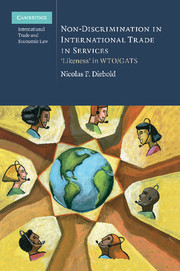Book contents
- Frontmatter
- Contents
- Foreword
- Acknowledgements
- Abbreviations
- List of Cases
- List of Legal Texts
- List of Documents
- Introduction
- PART I Foundations
- PART II Framing the conceptual breadth of ‘likeness’ in GATS
- PART III GATS specific ‘likeness’ issues
- PART IV Methodology for the ‘likeness’ analysis in GATS
- 13 The border tax adjustments framework
- 14 Applying market definition theories to ‘likeness’
- 15 The PPM-problem in the GATS ‘likeness’ context
- 16 Concluding summary: substitutability framework
- Summary of conclusions
- Bibliography
- Index
14 - Applying market definition theories to ‘likeness’
Published online by Cambridge University Press: 10 January 2011
- Frontmatter
- Contents
- Foreword
- Acknowledgements
- Abbreviations
- List of Cases
- List of Legal Texts
- List of Documents
- Introduction
- PART I Foundations
- PART II Framing the conceptual breadth of ‘likeness’ in GATS
- PART III GATS specific ‘likeness’ issues
- PART IV Methodology for the ‘likeness’ analysis in GATS
- 13 The border tax adjustments framework
- 14 Applying market definition theories to ‘likeness’
- 15 The PPM-problem in the GATS ‘likeness’ context
- 16 Concluding summary: substitutability framework
- Summary of conclusions
- Bibliography
- Index
Summary
The policy of international trade is undoubtedly linked very closely to competition policy, as both areas strive to ensure equal conditions of competition by eliminating market distortions. The main broad difference between the two areas lies in the fact that trade law addresses market limitations that are created by governments, whereas competition law prohibits market distortions created by non-state actors, in particular private enterprises. Despite the complementary character of the two legal and economic fields, competition law is still largely a matter of national domain. Unlike in the area of trade, international cooperation in rule making and enforcement of competition policy is very limited.
The WTO initiated numerous attempts to explore the interactions between trade and competition policy. At the Singapore Ministerial Meeting of 1996, the WTO established the Working Group on the Interaction of Trade and Competition (WGTCP). During the Doha Ministerial Meeting in 2002, it was decided to include the interaction of trade and competition in the Doha Declaration in order to conduct further studies and negotiations on this subject. The mandate was formulated very broadly, directing the Working Group to focus on the clarification of ‘core principles, including transparency, non-discrimination and procedural fairness, and provisions on hard core cartels; modalities for voluntary cooperation; and support for progressive reinforcement of competition institutions in developing countries through capacity-building’. However, already in August 2004 the issue had been dropped from the Doha agenda.
- Type
- Chapter
- Information
- Non-Discrimination in International Trade in Services‘Likeness' in WTO/GATS, pp. 269 - 338Publisher: Cambridge University PressPrint publication year: 2010



